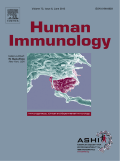
HUMAN IMMUNOLOGY
Scope & Guideline
Championing Research in Allergy and Immunology
Introduction
Aims and Scopes
- Transplant Immunology:
Research on the immunological aspects of solid organ and hematopoietic stem cell transplantation, including HLA matching, donor-specific antibodies, and rejection mechanisms. - Cancer Immunology:
Exploration of immune responses in cancer, development of immunotherapies, and the role of tumor microenvironments in modulating immune functions. - Autoimmunity and Immunodeficiencies:
Studies on the pathogenesis of autoimmune diseases, genetic predispositions, and the role of immune dysregulation in conditions such as systemic lupus erythematosus and rheumatoid arthritis. - Infectious Diseases and Immunity:
Investigations into the immune response to infectious agents, vaccine development, and the impact of infections on immune system functionality. - Immunogenetics:
Research into the genetic factors influencing immune responses, including HLA polymorphisms, and their implications for susceptibility to diseases and transplant outcomes. - Cellular and Molecular Immunology:
Studies focusing on immune cell differentiation, signaling pathways, and the molecular mechanisms underlying immune responses.
Trending and Emerging
- COVID-19 Immunology:
Research related to the immune response to SARS-CoV-2, including vaccine efficacy, antibody responses, and the impact of COVID-19 on immunocompromised patients, has surged in prominence. - Personalized Immunotherapy:
The emergence of personalized immunotherapy approaches, particularly in cancer treatment, is gaining significant attention, highlighting the need for tailored strategies based on individual immune profiles. - Regulatory T Cells and Tolerance:
There is an increasing interest in understanding the role of regulatory T cells in maintaining tolerance, particularly in transplantation and autoimmune diseases. - Microbiome and Immune Interactions:
Research exploring the connections between the microbiome and immune system functionality is emerging as a critical area, emphasizing the role of gut health in overall immunity. - Novel Biomarkers in Transplantation:
The search for new biomarkers to predict transplant outcomes, including the role of non-HLA antibodies, is a growing field, aiming to enhance patient stratification and management. - Advanced Genomic Techniques in Immunology:
The utilization of next-generation sequencing and other advanced genomic techniques to study immune responses and genetic predispositions is increasingly prevalent.
Declining or Waning
- Basic Immunology:
There is a noticeable reduction in publications focusing solely on basic immunological principles without direct clinical applications, as researchers increasingly aim for translational studies. - Animal Models in Immunology:
Research utilizing animal models to study immune responses appears to be waning, possibly due to a growing emphasis on human-centric studies and the ethical considerations surrounding animal research. - Older Transplant Protocols:
Studies centered on traditional transplant protocols and older immunosuppressive therapies are becoming less frequent, as new strategies and personalized medicine approaches gain prominence. - Descriptive Epidemiology of Immunological Disorders:
There has been a decline in purely descriptive studies on the epidemiology of immunological disorders, as the field shifts towards understanding mechanisms and therapeutic targets.
Similar Journals

GENES AND IMMUNITY
Advancing the Frontiers of Genetics and ImmunologyGENES AND IMMUNITY, published by SpringerNature, is a leading scholarly journal dedicated to advancing the field of genetics and immunology. With an impressive impact factor and a distinguished ranking in the Q1 quartile of both Genetics and Immunology disciplines for 2023, this journal serves as a pivotal platform for researchers and professionals looking to explore the intricate relationships between genetic factors and immune responses. Established in 1999 and continuously published until 2024, it features high-quality peer-reviewed research articles, reviews, and commentary that address critical issues and recent advancements in the field. The journal adheres to rigorous academic standards, evidenced by its strong Scopus rankings, making it a valuable resource for students, researchers, and practitioners alike who are seeking to deepen their understanding of genetics' role in immunity. For those looking to keep abreast of cutting-edge insights, GENES AND IMMUNITY is an essential read.

JOURNAL OF CLINICAL IMMUNOLOGY
Transforming Understanding of Immunology and AllergyJOURNAL OF CLINICAL IMMUNOLOGY, published by SPRINGER/PLENUM PUBLISHERS, is a leading journal in the field of immunology, with an impressive standing as reflected in its Q1 ranking in both Immunology and Immunology and Allergy for 2023. With a history of publication dating back to 1981 and an E-ISSN of 1573-2592, this journal aims to disseminate cutting-edge research on diagnostic methods, therapeutic strategies, and understanding the mechanisms underlying immune responses. Its significant impact is underscored by its Scopus rankings, where it is placed in the top 15% of journals covering immunology and microbiology. The journal does not currently operate under an Open Access model, yet offers a robust platform for sharing essential findings that contribute to advancements in clinical immunology. As a resource for researchers, professionals, and students, the JOURNAL OF CLINICAL IMMUNOLOGY is pivotal in fostering dialogue and disseminating knowledge that enhances our understanding of immune-related diseases.
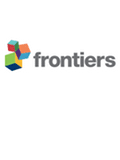
Frontiers in Immunology
Advancing Immunological Insights for a Healthier TomorrowFrontiers in Immunology is a leading open-access journal published by FRONTIERS MEDIA SA since 2010, dedicated to advancing knowledge in the field of immunology. With an impressive Q1 ranking in both Immunology and Allergy as of 2023, this journal exemplifies excellence in research dissemination, positioning itself among the top 22% of relevant literature in the discipline. The journal, based in Switzerland, emphasizes its commitment to open science by ensuring all published research is freely accessible, fostering collaboration and innovation among researchers, professionals, and students alike. With substantial visibility demonstrated by its ranks within the Scopus database—ranked #52 out of 233 in Immunology and Allergy, and #58 out of 236 in Immunology and Microbiology—Frontiers in Immunology serves as a vital platform for cutting-edge research. Researchers are invited to contribute original investigations and reviews that expand the understanding of immune mechanisms, therapeutic advancements, and clinical applications, making it a cornerstone for those looking to push the boundaries of immunological science.
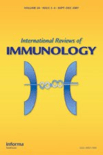
INTERNATIONAL REVIEWS OF IMMUNOLOGY
Connecting Global Minds in ImmunologyINTERNATIONAL REVIEWS OF IMMUNOLOGY, published by Taylor & Francis Inc, is a leading academic journal that has been a cornerstone of immunological research since its inception in 1986. With an impressive impact factor and ranked in the top quartiles of its field (Q2 in both Immunology and Allergy), this journal offers a critical platform for the dissemination of influential findings and advancements within immunology. Spanning a diverse array of topics, from basic immune mechanisms to clinical applications, it aims to support the global scientific community in enhancing immunological understanding and therapeutic interventions. Researchers and professionals alike benefit from insights provided by renowned contributors, ensuring that the journal remains relevant in a rapidly evolving field. Directly accessible through subscription or institutional access, INTERNATIONAL REVIEWS OF IMMUNOLOGY is committed to fostering collaboration and innovation, making it an essential resource for anyone involved in immunological research and practice.

IMMUNOBIOLOGY
Connecting researchers to revolutionize the understanding of immune systems.IMMUNOBIOLOGY is a prestigious academic journal published by Elsevier GmbH that significantly contributes to the fields of hematology and immunology. With its ISSN 0171-2985 and E-ISSN 1878-3279, this journal has been disseminating impactful research since 1979, positioning itself at the forefront of immunological and hematological advances. The journal holds a commendable ranking of Q2 in Hematology and Q3 in both Immunology and Immunology and Allergy, indicating its relevance and influence within the scientific community, as reflected by its Scopus rankings. Although IMMUNOBIOLOGY operates under a subscription model, it remains dedicated to expanding knowledge across disciplines, fostering innovative research, and facilitating connections among researchers, professionals, and students. Situated in Munich, Germany, this journal is continually evolving and aims to remain an essential resource for the latest discoveries and insights in the realms of immunity and blood disorders, ultimately enhancing our understanding of complex biological systems.

CRITICAL REVIEWS IN IMMUNOLOGY
Catalyzing Interdisciplinary Collaboration in ImmunologyCRITICAL REVIEWS IN IMMUNOLOGY, published by BEGELL HOUSE INC, is an essential journal in the field of immunology that has been contributing to the scientific discourse since 1980. With its ISSN 1040-8401 and E-ISSN 2162-6472, this journal provides a platform for critical analysis and comprehensive reviews that deepen understanding of immune responses and their implications in health and disease. Although currently categorized in the Q4 quartile for Immunology and Q3 for Immunology and Allergy, the journal's quality research and scholarly contributions are crucial for advancing knowledge within its fields—encompassing various aspects of innate and adaptive immunity. Researchers and professionals in immunology will find invaluable insights, aiding them in their quest for innovation and excellence, as the journal aims to foster interdisciplinary collaboration. While it does not operate on an open-access model, CRITICAL REVIEWS IN IMMUNOLOGY remains a significant resource for those dedicated to pushing the boundaries of immunology, with annual publications expected to last well into 2024 and beyond.
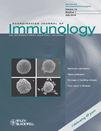
SCANDINAVIAN JOURNAL OF IMMUNOLOGY
Advancing Immunological Insights for a Healthier TomorrowScandinavian Journal of Immunology is a prestigious peer-reviewed journal published by Wiley, focused on the evolving field of immunology and its interdisciplinary ties with medicine. Since its inception in 1972, this journal has cultivated a rich repository of knowledge, showcasing innovative research and reviews that contribute to the understanding of immune system functions, disorders, and therapeutic interventions. With an impressive impact factor reflecting a Q2 ranking in Immunology and a top-tier Q1 status in miscellaneous Medicine categories for 2023, it is recognized for its high-quality scholarly output, positioning it among the leading journals in the field. Additionally, its Scopus ranking of #84 out of 236 in Immunology underscores its significance and relevance to both emerging and established researchers. Although it does not currently offer open access options, the journal’s expansive reach and rigorous publication standards make it an essential platform for disseminating impactful research to the global scientific community. The journal invites submissions that explore the complexities of the immune system, aiming to bridge clinical and basic science for a comprehensive understanding of immunological phenomena.

TRENDS IN IMMUNOLOGY
Bridging Research and Practice in ImmunologyTRENDS IN IMMUNOLOGY, published by CELL PRESS, stands as a premier source of insights and developments within the field of immunology. With an ISSN of 1471-4906 and E-ISSN of 1471-4981, this journal has established a strong reputation, evidenced by its prestigious status in Q1 quartiles for both Immunology and Allergy in 2023. It is ranked #13 out of 233 in the Scopus category of Medicine – Immunology and Allergy, and #16 out of 236 in Immunology and Microbiology, placing it within the top 94th and 93rd percentiles respectively. Since its inception in 1987, TRENDS IN IMMUNOLOGY has provided a critical platform for researchers, professionals, and students to access the latest advancements and integrative reviews in immunological research. The journal offers open access options, enhancing the accessibility of its high-impact content to a global audience. Researchers and practitioners rely on its pages not only for cutting-edge findings but also for comprehensive discussions that drive the future of immunology research.
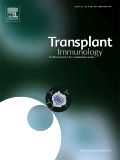
Transplant Immunology
Exploring Innovative Insights in Transplant Immunology.Transplant Immunology is a leading interdisciplinary journal published by Elsevier, dedicated to the advancing field of transplant science and immunology. With a strong reputation in the academic community, it currently holds a significant position in the Q3 quartile in both the Immunology and Allergy categories, as well as Q2 in Transplantation, reflecting its impact and relevance within these fields. Since its inception in 1993, the journal has explored a broad spectrum of topics, ranging from immunological mechanisms to clinical aspects of transplantation, serving as a vital resource for researchers, healthcare professionals, and students alike. Although it is not an open-access journal, it offers critical insights and innovative research findings that bridge theoretical knowledge and practical application, thereby enhancing our understanding of transplant immunology. As the field continues to evolve, Transplant Immunology remains committed to publishing high-quality studies that advance the dialogue between immunology and transplantation, fostering collaboration and discovery.
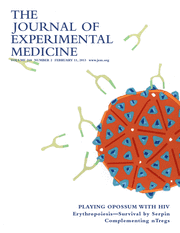
JOURNAL OF EXPERIMENTAL MEDICINE
Innovating Solutions for Tomorrow's Health ChallengesJOURNAL OF EXPERIMENTAL MEDICINE, published by Rockefeller University Press, is a renowned peer-reviewed journal dedicated to advancing the field of experimental medicine since its inception in 1896. With an impressive impact factor and categorized in the Q1 quartile for Immunology, Immunology and Allergy, and Miscellaneous Medicine, this journal stands at the forefront of medical research and innovation. It provides a prestigious platform for scholars and practitioners to disseminate groundbreaking findings that drive the understanding of disease mechanisms and therapeutic strategies. While the journal is not open access, it maintains high visibility and engagement within the scientific community, fostering collaboration among researchers, professionals, and students alike. The journal's consistent ranking in the top percentiles of Scopus illustrates its significant impact and commitment to excellence in medical research.